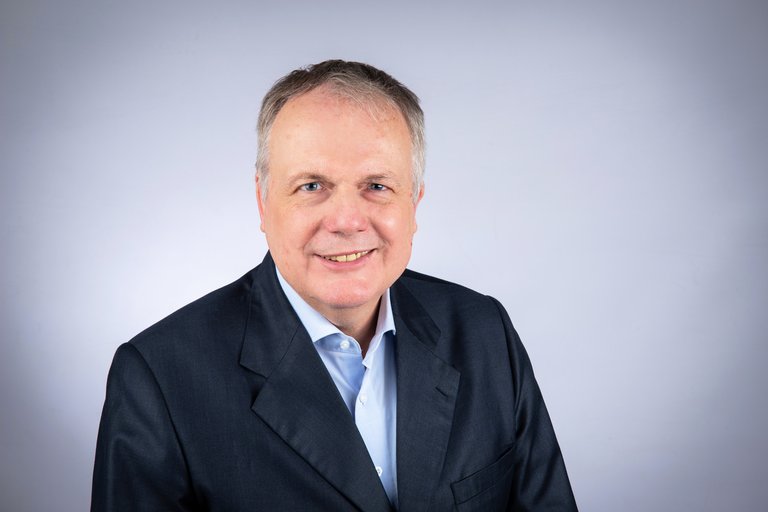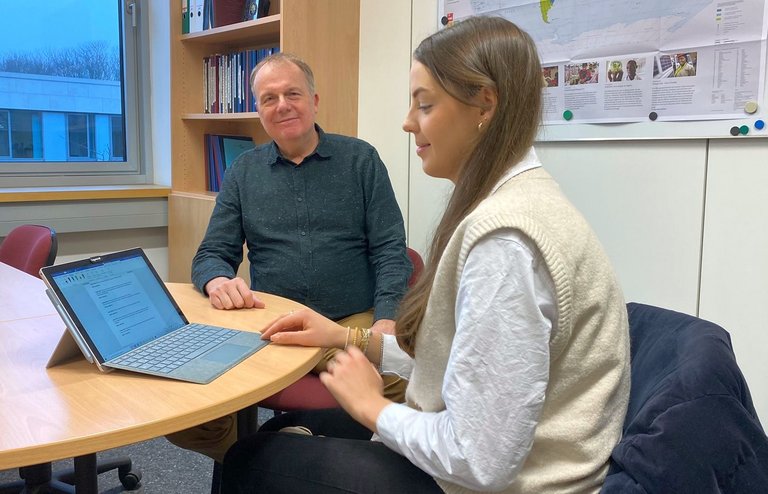Dr. Martin Löffelholz is Professor of Media Studies at the Technische Universität Ilmenau and has been working on war and crisis communication since the early 1990s. He is currently involved in two research consortia on public communication in the Corona pandemic. In his interview with UNIonline, he talks about his motivation and the goals of his research.

Prof. Löffelholz, your field of research enjoys a high international reputation in crisis communication. You have worked on numerous projects and founded an international research group in 2002 on this topic. What prompted you to take this step?
I have been involved with war and crisis communication since the second Gulf War, i.e., since 1991. As a young junior researcher, I had the task of giving a lecture on a different topic. When the war in Iraq began in January 1991, my boss asked me at the time to give a lecture on the subject of war and the media because of the enormous public attention and my background in journalism. Since then, the topic has stayed with me.
What experience did you have as a journalist before your academic career?
I spent a few months in Sri Lanka as a young journalist and got caught up in the incipient civil war there in 1983. I had been there for just one week, but instead of leaving I decided to stay. This allowed me to gain direct experience in an extremely difficult reporting situation. Since then, this topic has stuck with me, and with my appointment at the TU Ilmenau, I established a research focus on it. This has not least to do with the fact that we often only recognize how resilient organizations or people are in existentially threatening situations. We can therefore derive conclusions from the analysis of crisis situations that help us to improve our everyday lives or even organizations.
One of your current projects MIRKKOMM is investigating the crisis communication of health care institutions against the backdrop of the Corona pandemic – funded by the German Federal Ministry of Education and Research. What is the need for research here?
We see that the number of vaccinated people in Germany is not at the level we would need to end the pandemic. In the first year of the pandemic, this was not yet an issue, because at that time it was mainly about self-protection measures. But with the possibility of vaccination, the question arose as to why some people did not want to be vaccinated and what could be done from the government's point of view to increase the vaccination rate.The need for research, therefore, is firstly to find out what communicative measures were used in the first year of the pandemic to try to encourage the population to engage in self-protective behavior. Second, we want to investigate which communicative measures were used in the second year of the pandemic to try to encourage the population to vaccinate.
What do you expect from this?
At the end of the research project, we will develop a catalog of recommendations so that the state apparatus can act better in future major crises, not just pandemics. The special feature of the project is that we are including all three levels of government in the process, i.e., the national level, the states and the municipalities. This is important because the municipalities and local health departments are responsible for the concrete measures. However, there has been little scientific work on this to date. Therefore, this is an innovative and at the same time application and practice-oriented research project.
For what reason did you want to participate in this research project?
In recent years, I have already worked on other projects dealing with the crisis communication of state institutions, including the media relations of the German armed forces and the U.S. armed forces. In doing so, we gained experience in analyzing large organizations, which we can apply to the current project. In addition, there are personal reasons, as I have experienced various communication problems in my environment. As a professional observer of communication, I also saw in the early stages of the pandemic that there were various deficits. Our country was not as well positioned as we may have initially thought when infection numbers were relatively low. With our application-oriented research work, we can ensure that in future major crises, human lives will be better protected through improved communication.

Your research projects bring together many partners from science and practice; even international researchers are involved. How important is this kind of networking?
Networking plays a major role: The international partners are involved in MIRKKOMM as an external advisory body. They help us to see where we stand, give us suggestions from their respective researchers' perspectives and thus serve as an exchange of ideas and at the same time as a form of quality assurance. In addition, networking is important because each researcher has his or her own focus. For example, we have Professor Hans-Jürgen Bucher from KIT (Karlsruhe Institute of Technology), a specialist in multimodal storytelling. He deals with the question of how recipients perceive the information offered, where there are deficits, and how additional recipient groups can be reached in the future with a stronger visualization of information. Another partner is the Federal Institute for Risk Assessment in Berlin, which has a large number of contacts in public authorities and is also useful for this reason.
What are the tasks of the TU Ilmenau in this context?
We are first conducting a guideline survey of government officials. With this, we want to find out which factors were relevant for the communication in and about the pandemic and which problems arose. The second step relates to the analysis of relevant government documents. In doing so, we explore what role relevant action instructions had on communication and how to optimize them in the future. Finally, we use a two-wave representative survey of municipalities to analyze the experiences of mayors and health departments during the pandemic and how communication about major crises can be improved in the future.
What are the preparations for the project like?
The guideline survey of representatives of the federal government, the federal states and local authorities will begin shortly. We have prepared a comprehensive questionnaire for this purpose. In a second research project, the DECIPHER consortium funded by the DFG, we are also conducting a guideline survey, but from an international comparative perspective. In addition to Germany, five European countries – Great Britain, Italy, the Netherlands, Sweden, Spain - as well as the USA are included. We are supported by crisis communication researchers from the respective countries, who are funded by the DFG as so-called Mercator Fellows and will be visiting professors at the TU Ilmenau in June.
What's next?
The next step in the MIRKKOMM project will be to work on the analytical tools for the document analysis. In the second half of the year, we will then prepare the questionnaire for the representative survey of the municipalities.
Can students participate?
Yes, we have already hired several student assistants in both projects. In addition, we offer research seminars in the bachelor's and master's degree programs on the relevant topics.
The interview was conducted by Celine Ehret

